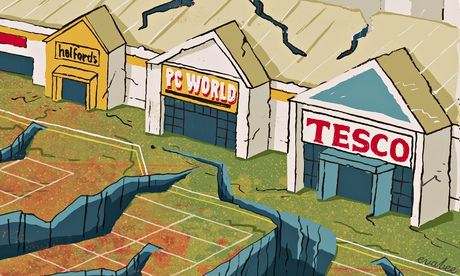Rebecca Smithers in The Guardian
The competition regulator is to scrutinise allegations that UK supermarkets have duped shoppers out of hundreds of millions of pounds through misleading pricing tactics.
Which? has lodged the first ever super-complaint against the grocery sector after compiling a dossier of “dodgy multi-buys, shrinking products and baffling sales offers” and sending it to the Competition and Markets Authority.
The consumer group claims supermarkets are pushing illusory savings and fooling shoppers into choosing products they might not have bought if they knew the full facts.
Examples raised by Which? include Tesco flagging the “special value” of a sweetcorn sixpack when a smaller pack was proportionately cheaper, and Asda raising the individual price of a product when it was part of a multi-buy offering in order to make the deal more attractive.
Richard Lloyd, the group’s executive director, said: “Despite Which? repeatedly exposing misleading and confusing pricing tactics, and calling for voluntary change by the retailers, these dodgy offers remain on numerous supermarket shelves. Shoppers think they’re getting a bargain but in reality it’s impossible for any consumer to know if they’re genuinely getting a fair deal.”
“We’re saying enough is enough, and using one of the most powerful legal weapons in our armoury to act on behalf of consumers by launching a super-complaint to the regulator. We want an end to misleading pricing tactics and for all retailers to use fair pricing that people can trust.”
The cumulative impact of all these different pricing tactics is that it is impossible for people to know if they are getting a fair deal, the consumer group says, particularly when prices vary frequently, consumers are in a hurry or are buying numerous low value items.
About 40% of groceries in Britain are currently sold on promotion, according to the retail analysts Kantar Worldpanel. With £115bn spent on groceries and toiletries in 2013, Which? said consumers could be collectively losing out to the tune of hundreds of millions of pounds.
The right to make a super-complaint to the CMA or an industry regulator is limited to a small number of consumer bodies such as Which? and Energywatch. Once Which? has submitted its dossier to the CMA, the regulator has 90 days to respond.
As a first step the CMA could request a market study, in which it could demand further information from the supermarkets themselves, before escalating to a full-blown investigation. A decade ago Citizens Advice helped bring the payment protection insurance scandal to public attention by lodging a super-complaint with the now-defunct Office of Fair Trading.
Which? has previously made super-complaints on care homes, credit card interest rates, Northern Ireland banking, private dentistry and the Scottish legal profession.
Meanwhile, new research suggests that more than 1,400 suppliers to Britain’s supermarkets are facing collapse as the cut-throat price war takes its toll on the industry.
The number of food and beverage makers in significant financial distress has nearly doubled to 1,414 in the last year, according to insolvency practitioner Begbies Traynor.
The findings will increase the pressure on the government and the groceries code adjudicator to take action to protect suppliers and prevent large companies from delaying payments or changing agreed terms.
Examples Which? sent to the CMA
Seasonal offers: higher prices only applied out of season, when consumers are less likely to buy the item. It found a Nestle Kit Kat Chunky Collection Giant Egg was advertised at £7.49 for 10 days in January this year at Ocado, then sold on offer at £5 for 51 days.
Was/now pricing: the use of a higher “was” price when the item has been available for longer at the lower price. Acacia honey and ginger hot cross buns at Waitrose were advertised at £1.50 for just 12 days this year before going on offer at “£1.12 was £1.50” for 26 days.
Multi-buys: prices are increased on multi-buy deals so that the saving is less than claimed. Asda increased the price of a Chicago Town Four Cheese Pizza two-pack from £1.50 to £2 last year and then offered a multi-buy deal at two for £3. A single pack went back to £1.50 when the “offer” ended.
Larger pack, better value: the price of individual items in the bigger pack are actually higher. Tesco sold four cans of Green Giant sweetcorn for £2 last year, but six cans were proportionately more expensive in its “special value” pack, priced at £3.56.

